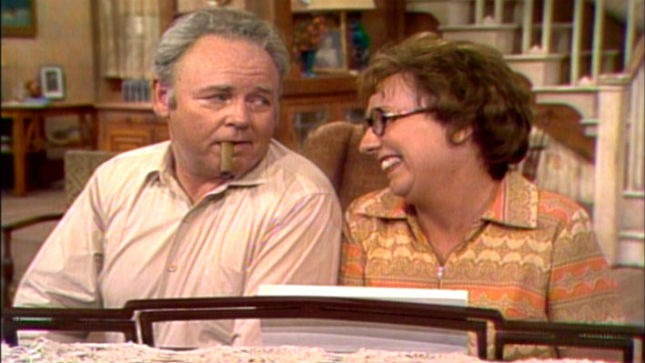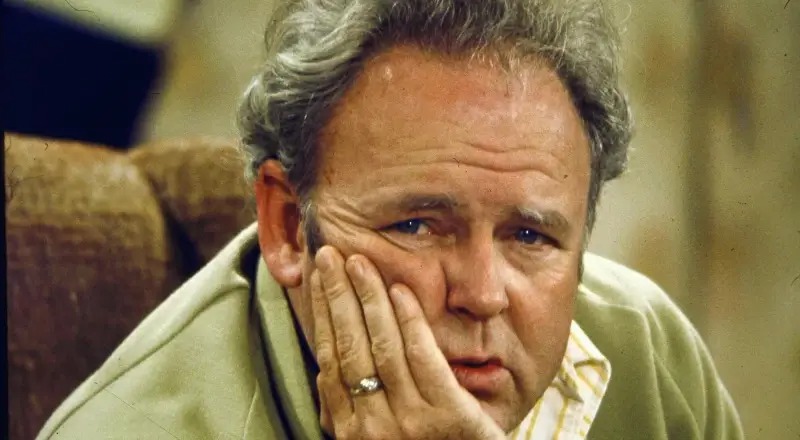
The man behind TV’s “All in the Family” says presidential contender Donald Trump resembles one of the beloved sitcom’s most controversial characters.
“He is Archie Bunker,” Norman Lear said late Thursday, according to Deadline. “I think of Donald Trump as the middle finger of the American right hand. Why is this happening? Whether you’re Republican or a Democrat, can we all seriously agree this is bad for America?”
{mosads}Lear said the Republican Party’s direction is mostly to blame for Trump’s popularity with GOP voters, however.
“I think this is a case of the American people saying, ‘this is the kind of leadership you are giving us,’ because they didn’t invent him,” he told listeners at the Writers Guild gala.
 “The Republican Party handed it to them. I think they are saying, ‘screw you.’ I don’t think they are married to the notion that he is going to be a great president.”
“The Republican Party handed it to them. I think they are saying, ‘screw you.’ I don’t think they are married to the notion that he is going to be a great president.”
Chuck Lorre, another veteran sitcom creator, refused to comment on the GOP’s de facto presidential nominee Thursday night.
“Let me just point out ‘Two and a Half Men’ beat ‘The Apprentice’ regularly in the ratings,” he said, jokingly comparing his comedy with Trump’s reality television competition.
Lear has previously compared Trump to Bunker, the blue-collar, politically incorrect protagonist of 1970s hit “All in the Family.” The TV producer said late last year Trump would probably resonate with the outrageously right-wing character.
“Would Archie Bunker be a supporter?” he asked The Daily Beast. “Yes, he would be saying, ‘take that.’ He’d find a way of blaming the left for Donald Trump. Donald Trump is a fool and an assh—e. It’s a ‘f-ck you’ to the establishment. It isn’t a heartfelt belief in this guy.”
Few shows defined American culture quite like All in the Family. And few creators shook things up the way Norman Lear did. But when Lear dropped a bombshell, calling Donald Trump the real-life version of Archie Bunker, the Internet exploded.
But what does that really mean?
Let’s break it all down—what the comparison implies, why it matters, and how the character of Archie Bunker still holds up as a mirror to society today.
What Sparked the Comparison?
Norman Lear’s Bold Statement
Norman Lear didn’t mince words. When asked about Donald Trump during an interview, he famously said:
“He is Archie Bunker.”
That’s not a casual throwaway line—it’s a direct hit with cultural and political weight.
A Reflection or a Warning?
Lear meant that Trump embodies the very traits that All in the Family tried to expose: intolerance, stubborn nationalism, and resistance to change. It wasn’t praise—it was a caution.
Who Is Archie Bunker, Really?
TV’s Most Lovable Bigot
Archie Bunker, played by Carroll O’Connor, was a working-class white man with a whole lot of opinions—and not always the most enlightened ones. He represented a specific slice of America: conservative, blue-collar, and deeply uncomfortable with a changing world.
Why Viewers Still Loved Him
Despite his flaws, Archie was also human. He wasn’t evil. He was scared, proud, and often wrong—but real. That’s what made him iconic. And maybe… relatable.
Donald Trump and the Bunker Blueprint
Brash, Blunt, and Unapologetic
Sound familiar? Trump’s approach to politics mirrors Archie’s approach to dinner-table conversations. Loud, opinionated, and always convinced he’s right.
Old-School Values vs. Progress
Both figures championed the “good old days”—and both were skeptical of the new. Whether it was civil rights, immigration, or gender equality, Archie and Trump echoed many of the same sentiments, just in different arenas.
The Social Commentary Behind ‘All in the Family’
Lear’s Original Vision
Lear didn’t create Archie Bunker as a hero. He created him as a lesson. A satirical lens on how outdated ideas can harm progress—and how laughter can make us confront uncomfortable truths.
Holding a Mirror to America
When Lear compares Trump to Bunker, he’s not making a joke. He’s holding up a mirror and saying, “Look—this is who we warned you about.”
The Dangerous Side of the Comparison
When Satire Becomes Reality
The issue? Archie was fiction. Trump is real. Lear’s warning becomes eerie when the caricature steps off the screen and into the White House.
A Shift in Public Perception
What was once satire is now seen by many as truth. And when people celebrate Archie-like behavior in real life, the joke stops being funny.
How the Public Reacted
Twitter Explodes with Opinions
Social media blew up after Lear’s statement. Some agreed wholeheartedly. Others were outraged. But one thing’s clear—it hit a nerve.
Why the Statement Went Viral
Because it felt true to many. The parallel was obvious, and it forced people to think about politics through a pop culture lens.
Does This Mean Trump Is Racist Like Bunker?
Let’s Be Honest
Archie wasn’t just conservative—he was openly bigoted. He used slurs and clung to stereotypes. Trump’s critics have accused him of similar behavior, from his comments on immigration to his divisive rhetoric.
Intent vs. Impact
Whether or not Trump intends to echo Archie’s prejudice, the impact often feels the same to those on the receiving end.
What Lear Really Wants You to Understand
A Wake-Up Call, Not an Insult
Lear’s comparison isn’t about slamming Trump—it’s about waking up America. He’s urging people to recognize how easily society can slip backward.
Don’t Laugh It Off
Archie was funny. But what he represented? Not so much. Lear wants viewers—and voters—to separate the humor from the harm.
Why This Conversation Still Matters
Pop Culture Shapes Politics
Whether we admit it or not, TV shows influence how we see the world. And comparing Trump to Archie forces us to reevaluate what we’ve normalized.
‘All in the Family’ Is Still Relevant
More than 50 years later, the show’s themes still resonate. And Lear’s commentary proves that we’re not done learning from Archie yet.
Are We Living in Archie Bunker’s America?
Stalled Progress
From political division to cultural backlash, some say we’re living in the world Archie feared—and Trump embraces.
History Repeats
The 1970s had Archie. The 2020s have Trump. Different decades, same debates.
Why Norman Lear’s Voice Still Matters
A Legacy of Provocation
Lear’s career has always been about challenging comfort zones. From Maude to The Jeffersons, he used comedy to confront racism, sexism, and inequality.
The Power of Storytelling
By comparing Trump to Archie, Lear doesn’t just make headlines—he tells a story that forces reflection.
The Archie-Trump Connection in Pop Culture
Saturday Night Live Skits
SNL has often drawn comparisons between the two—sometimes casting Trump as an exaggerated Archie figure to highlight political absurdities.
Internet Memes and Commentary
TikTok, Instagram, and Twitter are filled with side-by-side clips of Archie’s rants and Trump’s speeches. The resemblance? Uncanny.
What Can We Learn From This Comparison?
Listen, Learn, and Grow
Instead of dismissing Archie—or Trump—outright, maybe the lesson is to listen. Understand where these views come from, and why they resonate.
Change Starts With Awareness
By recognizing the Archie in our politics, maybe we can change the script.
Conclusion: More Than a TV Character
Norman Lear’s comment wasn’t about getting laughs—it was about sparking a conversation. Whether you love or hate Trump, the comparison to Archie Bunker forces us to look inward. It challenges us to ask hard questions:
What have we tolerated? What have we celebrated? And where do we go from here?
In the end, All in the Family wasn’t just a sitcom. It was a warning.
And maybe it still is.
